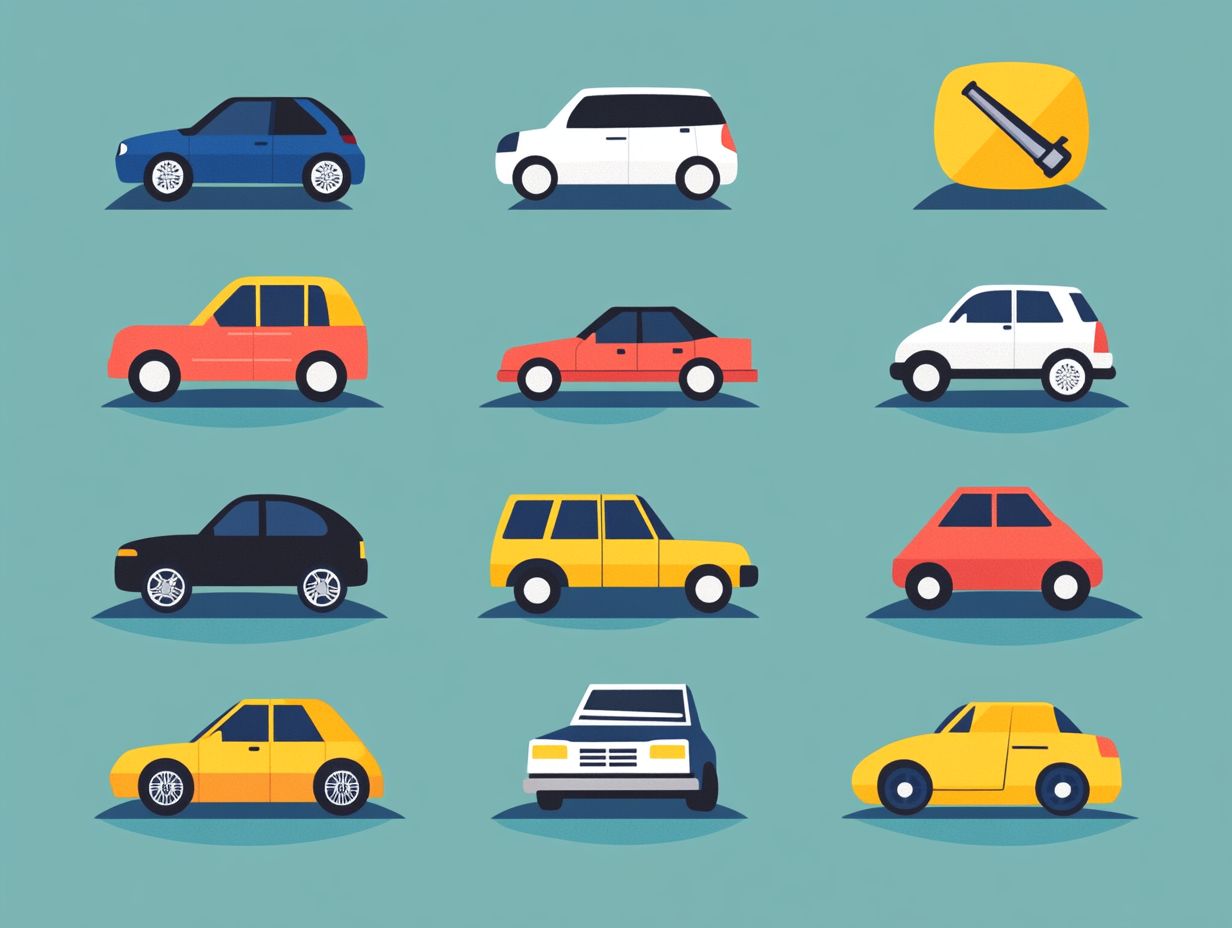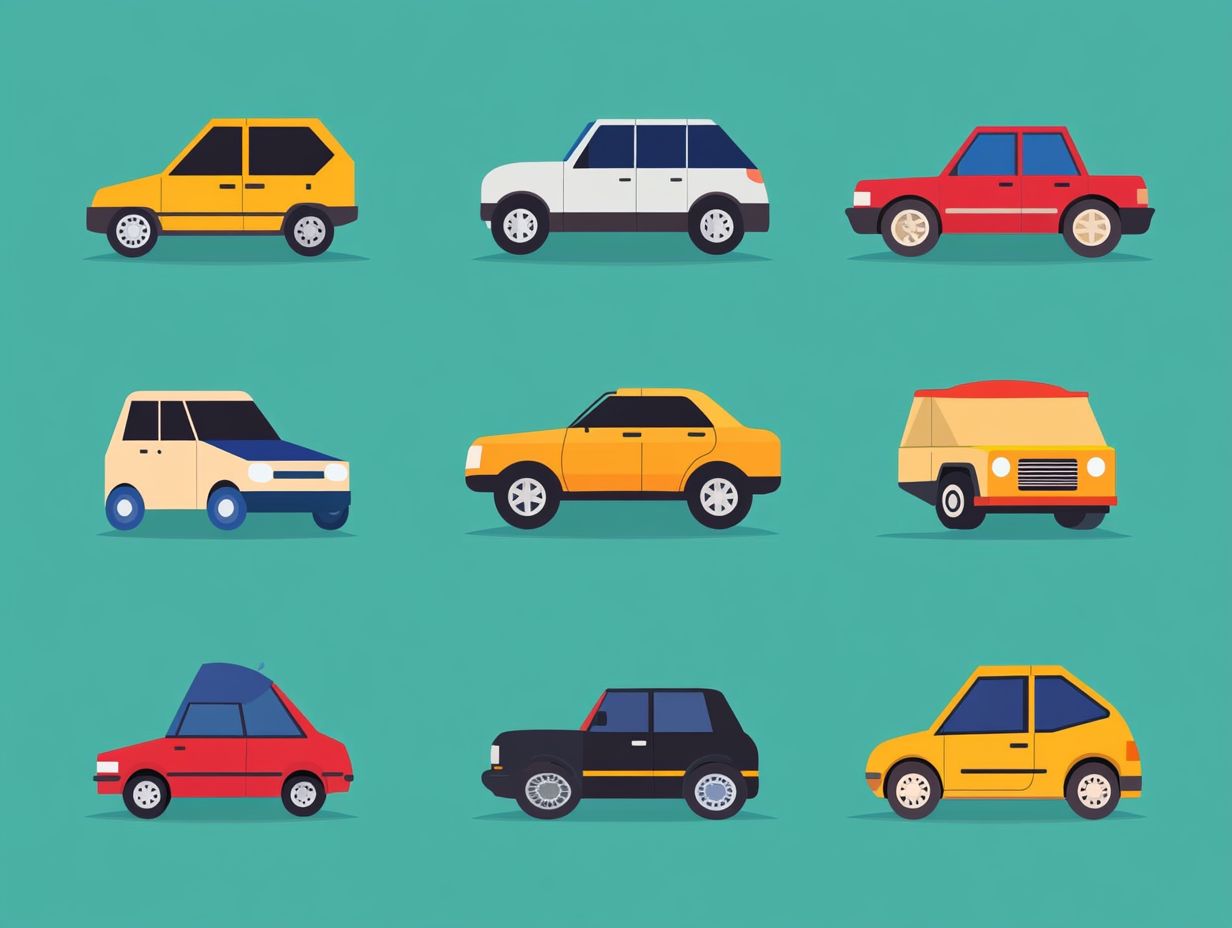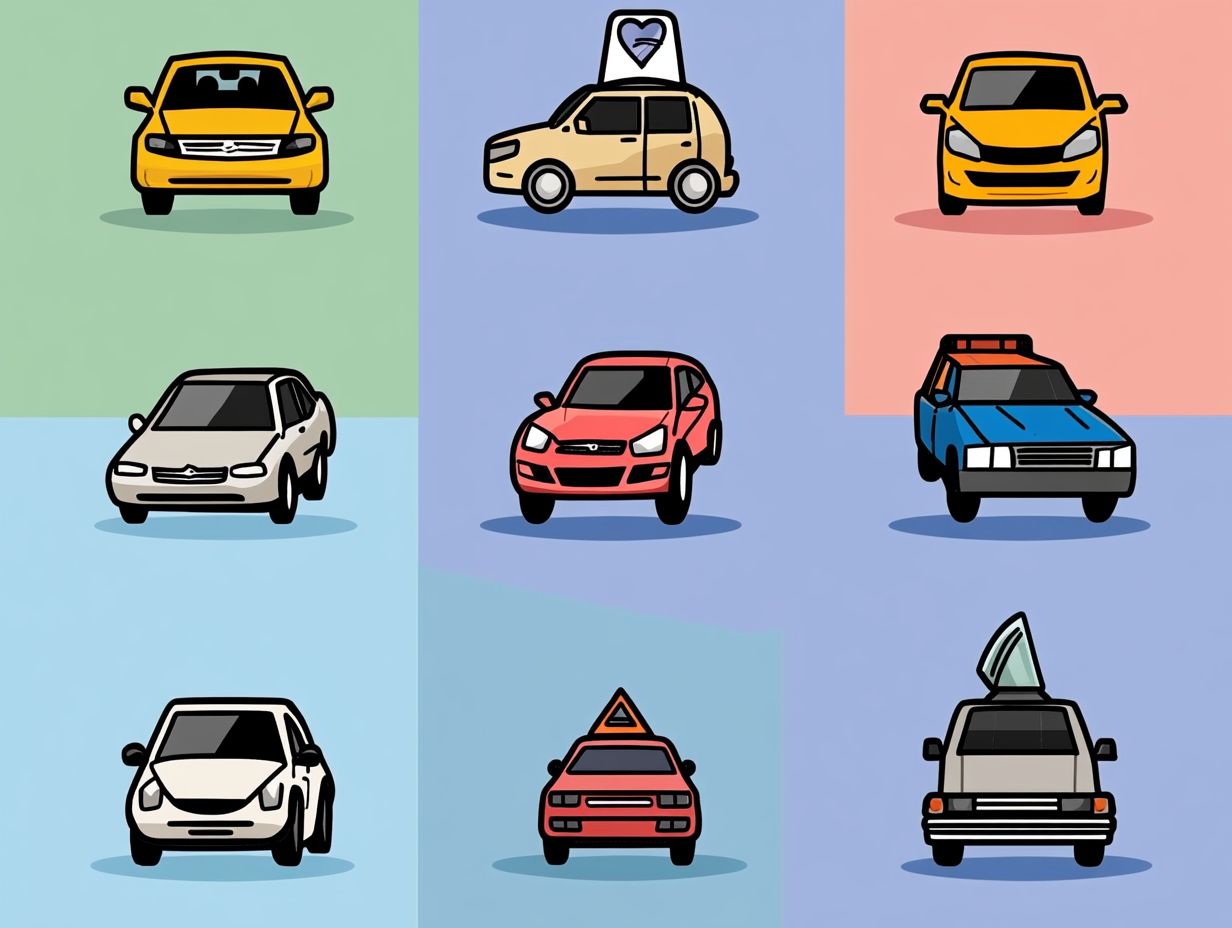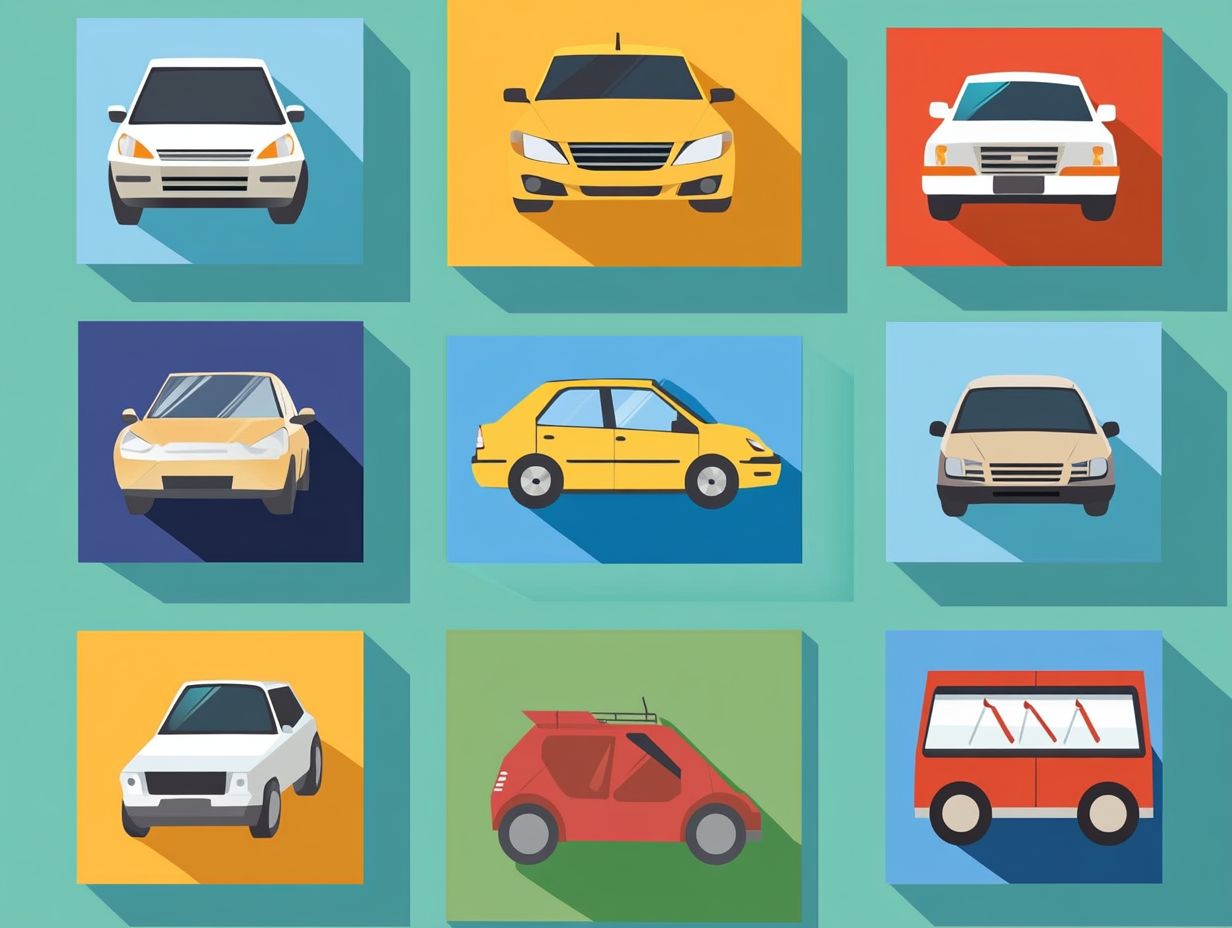What Are the Different Types of Car Insurance?
Car insurance is an essential element of responsible vehicle ownership. It provides protection against financial setbacks from accidents and unexpected incidents.
Understanding the different types of car insurance is vital for making informed decisions. Let s explore the various coverage types that can save you money and stress!
This article highlights key coverage types, including liability, collision, and comprehensive insurance. We ll also discuss crucial factors to consider when choosing the right policy tailored to your specific needs.
Your journey to worry-free driving begins today!
Contents
Key Takeaways:

- Liability coverage protects you from financial loss if you cause an accident.
- Collision coverage pays for repairs to your car after an accident, regardless of fault.
- Comprehensive coverage protects against non-collision incidents like theft or vandalism.
Why Car Insurance is Important
Car insurance is critical for safeguarding you against the unpredictable nature of road incidents. It offers vital financial protection against potential accidents and their repercussions.
Without adequate auto coverage, you expose yourself to hefty repair costs, medical expenses, and liability claims from collisions or other vehicle mishaps.
Understanding the different types of coverage enhances your financial security. For example, liability coverage isn t just a smart move; it s often a legal requirement. It ensures you can cover damages or injuries to others in an accident.
Options like comprehensive and collision coverage provide additional layers of protection. They guard against damage to your vehicle due to theft, vandalism, or accidents.
By securing the right car insurance, you meet legal obligations and cultivate peace of mind, knowing you are prepared for whatever the road may throw your way.
Types of Car Insurance
Knowing the various types of car insurance is essential for you as a driver. This knowledge enables you to choose the options that best suit your needs while complying with state regulations.
Each form of coverage serves a unique purpose: liability coverage safeguards you against third-party claims, collision coverage addresses damages to your vehicle, and comprehensive coverage protects against non-collision incidents. Together, they form a crucial framework for your overall auto protection.
Liability Coverage
Liability coverage is vital. It shields you from financial losses if you cause injury or damage in an accident. This coverage includes bodily injury liability, which covers medical expenses for those injured, and property damage liability, which pays for repair costs for damaged vehicles and property.
Opting for this coverage isn’t just a wise decision; in many places, it’s a legal requirement. It ensures that everyone on the road shares some financial responsibility.
You can select different limits of liability coverage, allowing you to tailor your policy to your specific needs and risk factors. By choosing higher limits, you protect yourself from significant financial strain, especially in serious accidents where expenses can skyrocket.
Having a clear grasp of these limits enables you to make informed choices. This not only provides peace of mind but also contributes to safer roadways for everyone.
Take action now! Review your current policy or get a quote to find the best coverage for you!
Collision Coverage
Collision coverage is an essential insurance option that helps cover repair costs for your vehicle after an accident, regardless of who is at fault. If you find yourself in a collision whether with another vehicle or an object you can submit insurance claims to alleviate the financial burden of repairs.
Understanding how collision coverage works can influence how you handle post-accident scenarios. You might not realize how beneficial this coverage is, especially in high-traffic or urban areas where accidents are more frequent.
The choice of deductible the amount you pay before insurance kicks in is another crucial factor that impacts your out-of-pocket expenses. Opting for a higher deductible can lower your monthly premiums, but it may increase your costs when you file a claim. It s vital to find a balance that aligns with your financial priorities, so you are prepared to manage any potential repair costs efficiently.
Comprehensive Coverage

Comprehensive coverage provides financial protection against damages to your vehicle from non-collision incidents, such as theft, vandalism, or natural disasters. This coverage shields you from unexpected events and enhances your overall vehicle protection by complementing your collision coverage.
Choosing comprehensive coverage can be a smart investment, especially if you own a high-value car. When unforeseen circumstances arise like a tree toppling during a storm or flood damage this coverage helps you avoid hefty repair bills.
Understanding how various insurance quotes factor into your comprehensive options is essential. Rates can fluctuate based on your vehicle’s value, location, and personal driving history. Gathering multiple quotes and comparing coverage levels is wise to find the best fit for your needs.
Ultimately, comprehensive coverage serves as your safety net, offering peace of mind as you protect your investment.
Uninsured/Underinsured Motorist Coverage
Uninsured and underinsured motorist coverage is crucial for you if you re looking for extra financial protection in case of an accident with someone who doesn t have enough insurance. This coverage ensures you receive compensation for medical expenses and damages, effectively addressing liability concerns that may arise.
In many situations especially during hit-and-run incidents or encounters with underinsured drivers this coverage can be a financial lifesaver. Imagine being hit by an uninsured driver; your medical bills and vehicle repairs could skyrocket, leaving you with hefty out-of-pocket expenses.
It’s essential to know that many states impose specific requirements for these coverage options. Being informed about local laws is vital for all drivers. This type of coverage complements standard policies, filling gaps that could leave you vulnerable after an accident, ultimately ensuring peace of mind while on the road.
Personal Injury Protection (PIP)
Personal Injury Protection (PIP) is an invaluable coverage option that helps cover medical expenses and lost wages after a car accident, regardless of fault. This coverage protects drivers and passengers and extends benefits to pedestrians involved in accidents.
PIP can significantly ease the financial strain that often accompanies an accident by covering costs like hospital bills, rehabilitation expenses, and even childcare if needed. In some states, PIP is mandatory, while in others, it serves as an optional enhancement to a standard auto insurance policy.
For example, in New York, the coverage limits are typically higher than in a no-fault state like Florida, where the benefits can vary considerably.
By alleviating immediate out-of-pocket expenses, this protection supports your recovery and grants you peace of mind, allowing you to focus on healing without worrying about the financial ramifications of your injuries.
Medical Payments Coverage
Medical Payments Coverage is an important car insurance option that covers your medical expenses and those of your passengers after an accident, regardless of who s at fault. This coverage offers vital financial support during recovery. It ensures you re not left scrambling for funds when you need them most.
This coverage is crucial, especially right after a serious collision when you need immediate medical care the most! If you re injured in an accident while driving your vehicle, medical payments coverage can help cover hospital bills, doctor visits, and rehabilitation costs without delay.
Personal Injury Protection, or PIP, covers more than just medical expenses. It also addresses lost income and essential services needed during recovery. While PIP may offer a more comprehensive solution for overall recovery support, medical payments coverage stands as a vital safeguard for those seeking direct assistance with medical costs, making it a valuable addition to any auto insurance policy.
Factors to Consider When Choosing Car Insurance
Choosing car insurance? Consider different factors to find the best coverage for your unique needs!
From grasping the nuances of different insurance rates and potential discounts to assessing your personal requirements and driving habits, each element significantly influences your coverage decisions.
Cost and Coverage Options

The cost of car insurance varies widely based on your selected coverage options. This includes things like deductible limits, which are the amounts you pay out of pocket before your insurance kicks in, insurance premiums, and the specific types of coverage you choose. Understanding how these elements interact enables you to make informed decisions that strike a balance between affordability and adequate protection.
For instance, you might discover that opting for a lower deductible leads to higher monthly premiums, but this approach could save you from significant out-of-pocket expenses if you need to file a claim. Conversely, selecting higher deductibles can lower your premium costs but may result in substantial expenses during an accident.
Different types of coverage such as liability, collision, and comprehensive each come with their own premiums and impact your overall costs. By comparing insurance quotes from various providers, you can find the most suitable combination of coverage and cost tailored specifically to your needs.
State Requirements
Every state has its unique car insurance requirements that outline minimum coverage levels. Understanding these is crucial to avoid legal issues and ensure you have adequate protection.
Some states mandate liability coverage to protect you against claims for damages you might cause in an accident, while others also require personal injury protection or uninsured motorist insurance. For example, if you’re driving in Florida, you’ll need to carry $10,000 in personal injury protection. Meanwhile, if you’re in California, you’ll be required to have a minimum liability coverage of $15,000 per person for bodily injury.
Don’t risk it! Failing to meet these requirements can lead to hefty fines and serious consequences for your financial health and driving privileges.
Personal Needs and Driving Habits
Assess your personal needs and driving habits when selecting car insurance. These factors significantly influence the coverage you need and the discounts available to you. Tailoring your policy to fit your lifestyle ensures your vehicle is adequately covered and optimizes your financial investment.
If your daily commute involves a long drive or you often go on weekend road trips, knowing these patterns helps you find better coverage options that match your risk level. Explore discounts for low mileage and safe driving habits to potentially lower your premiums.
Take a moment to evaluate your driving habits! This can unlock peace of mind and save you money through informed insurance choices.
Frequently Asked Questions
What Are the Different Types of Car Insurance?
Car insurance provides financial protection against damages and injuries in a car accident. Various types of car insurance offer different coverage levels.
What is Liability Insurance?

Liability insurance is the minimum insurance required to cover what you might owe others if you cause an accident. It does not cover damages to your own vehicle.
What is Collision Coverage?
Collision coverage pays for repairing or replacing your vehicle if it s damaged in a car accident. This insurance is usually required if you have a car loan.
What is Comprehensive Coverage?
Comprehensive coverage protects your vehicle from damages not caused by a car accident, such as theft, vandalism, or natural disasters. It s often required if you lease or finance your vehicle.
What is Personal Injury Protection (PIP) Insurance?
Personal Injury Protection (PIP) insurance covers medical expenses and lost wages for you and your passengers in a car accident, no matter who is at fault. It s mandatory in some states.
What is Uninsured/Underinsured Motorist Coverage?
Uninsured/Underinsured Motorist Coverage protects you if you re involved in an accident with a driver who doesn t have enough insurance to cover the damages. It also covers hit-and-run accidents.
Contact your insurance agent today to find discounts tailored to your driving habits!






